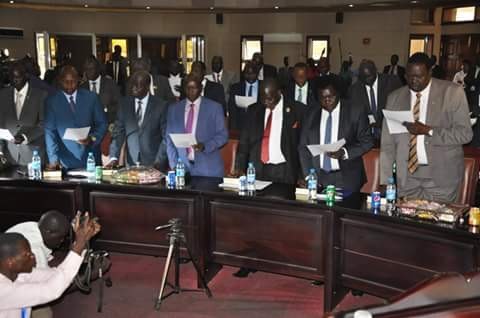The 28 new district governments that South Sudan’s central government is setting up in place of the previous state governments will have five to seven ministries only, President Salva Kiir said on Tuesday at the swearing-in of the appointed district leaders.
The limitation is due to the cost of maintaining government ministries in 28 different capitals.
In two decrees, one issued 2 October and the other 24 December, Kiir has announced the abolishment of the ten states established by the country’s 2011 constitution and their replacement by appointed administrations in 28 areas carved out largely along ethnic lines.
Last week the president removed all of the governors of the existing states – 8 of 10 of the governors elected in the previous 2010 elections had already been removed – and he jailed the ousted governor of Western Equatoria State, Joseph Bakosoro.
According to the president, the economic situation in the country makes it challenging to implement the new system of government, but the new districts will be able to manage with the help of resources raised locally.
“Your governments, I want to emphasize this point, that our economy is bad. For this reason the governments must be small. They will be lean governments,” Kiir said Tuesday.
Kiir explained that each of the 28 administrations will be equal in size and will have no more than 5-7 ministers. He justified this as a cost-saving measure to prevent employment of people who “get money without doing anything.”
“With the hard work of raising resources from your own local resources you will have to work for that. And so the ministries will be limited. We saw it in the past – ministers were not equal in the states. There were people who maintained up to 9 but there were [other] people who went up to 18,” Kiir noted.
“And then the list of advisors almost goes to 400. Now if you have 400 advisors what do they advise you? That is just an employment that you want them to get money without doing anything.”
Kiir went on to disclose that a new decree will be issued on the matter.
“We have not yet finalized this but we in the SPLM Political Bureau we were talking about it and we are still going through. We will give you the real number of ministries when we finalize it… We want to make it six ministries and a governor and a deputy – if we make it five – the same if we make it seven. So the figure is within these three digits… The order will come out officially.”
At this point, each of the 28 districts is headed by a ‘governor’ appointed by Kiir, without any other officials or administrators. Kiir announced on 2 October that he would appoint all assembly members for every one of the new districts, but to date he has not done so.
This has led to confusion in some areas, particularly since the decree of 24 December, which declared existing governments to be “defunct”. For example, civil servants and ministers who showed up to work at ministries in the Western Bahr el Ghazal State capital Wau were turned away by security personnel Monday, the first day back after the Christmas holiday.
Kiir’s statements today may come as a disappointment to proponents of the 28 states proposal, many of whom cited the creation of government jobs as a major benefit of the restructuring. Overall, however, supporters have responded with excitement to Kiir’s new decree, congratulating him and the new governors on their appointment and swearing-in on Tuesday.
SPLM-IO, the armed group that signed a peace deal with the government in August, says the move to create 28 states violates the peace agreement, which was based on a power-sharing formula for ten states. However, in remarks on Monday, the SPLM-IO chief negotiator Taban Deng said the move would not plunge the country back to war.
Mediators of the East African regional body IGAD called the 2 October decree a violation of the August peace agreement “in letter and spirit,” but they have said nothing yet about the Christmas Eve decree.
Photo: Swearing-in ceremony of Kiir’s new 28 appointees in Juba today




